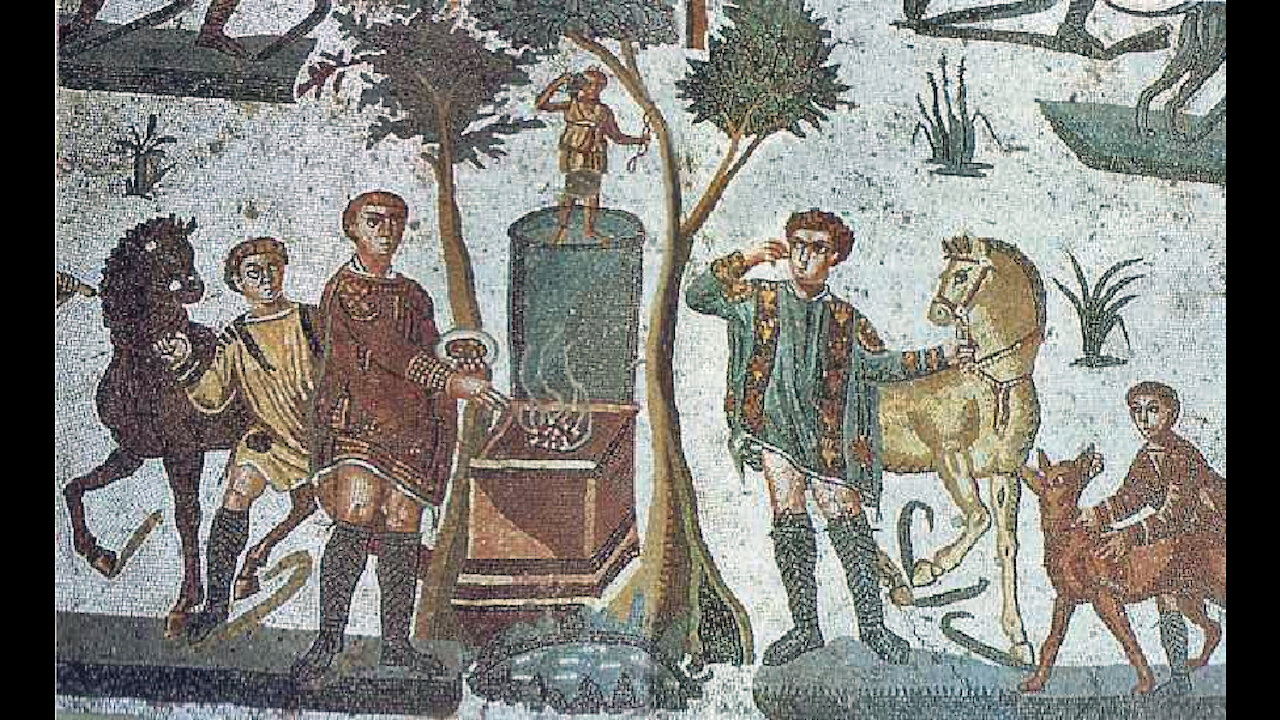Premium Only Content

Ein Opfer - und die Folgen!
A Sacrifice and the Consequences:
The early Christian writer Lactantius relates the following true incident from the beginning of Diocletian’s reign.
The Emperor Diocletian was very interested in investigating the future, so he tried to find out what was to come by sacrificing small animals and the subsequent liver show. One day there were also Christians present who had painted the sign of the cross on their foreheads.
Now that the demons had been driven away in this way, the sacrificial ceremonies were disturbed. As the sacrificial Haruspices or offering priests trembled, they had to sacrifice repeatedly, but the usual marks did not appear in the entrails.
Again and again sacrificial animals were slaughtered, but they showed nothing, until a pagan sacrificial priest suspected that the sacrifices showed nothing, because people were present who shrank back at such religious ceremonies and felt horror.
Then the angry emperor ordered all those in the palace court to sacrifice, especially the soldiers, to be forced to make these nefarious sacrifices. If they did not obey, they were to be punished with blows.
For that was the extent of his fury and his anger.
At that time, at least, he had done nothing further against the law and the worship of true God. Later, however, the emperor was even tempted to persecute and exterminate Christians. We know exactly what crimes were committed as a result of his anger and fury.
The last great wave of persecution took place under Emperor Diocletian (284 to 305). The persecution was ordered by law in 303 A. D. throughout the Roman Empire. We know well about the persecution of Christians from various works of Latin literature. And non-Christian authors also reported on it.
Lactantius was an early Christian writer, who became an advisor to Roman emperor Constantine I, guiding his Christian religious policy in its initial stages of emergence, and a tutor to his son.
His most important work: the Divine Institutes, an apologetic treatise intended to establish the reasonableness and truth of the Christian faith to pagan critics.
He is best known for his apologetic works, widely read during the Renaissance by humanists who called Lactantius the "Christian Cicero".
Lactantius was a Berber, born into a pagan family. He was a pupil of Arnobius who taught at Sicca Veneria in today’s Tunisia, an important city in Numidia.
In his early life, he taught rhetoric in his native town, in Numidia.
None of the fathers thus far had been more verbose on the subject of the millennial kingdom than Lactantius or more particular in describing the times and events preceding and following.
He held to the literalist interpretation of the millennium, that it originates with the second advent of Christ and marks the destruction of the wicked, the binding of the devil and the raising of the righteous ones!
-
 1:23:28
1:23:28
KaiStuht
4 years agoDie Kolchose und ein schlechter Beigeschmack - Ignorance Radio 001
1.93K1 -
 50:19
50:19
AlaskanBallistics
17 hours ago $0.12 earnedI Love This Gun Podcast Episode 6
1.86K -
 16:35
16:35
DEADBUGsays
1 day agoPolice Stories Ep4
2.28K -
 6:15
6:15
RTT: Guns & Gear
1 day ago $0.02 earnedSaying Goodbye To A Legend - Demolition Ranch Leaving YouTube
2.4K4 -
 1:33:27
1:33:27
Michael Franzese
20 hours agoGovernment STEALING More than the Mob - Elon Musk's Report
45.6K42 -
 1:21:15
1:21:15
Tactical Advisor
4 hours agoThe Vault Room Podcast 008 | PSA Changing the Firearms Game and Trump Exposing Government Spending
67.7K20 -
 3:09:57
3:09:57
LittleDude games
9 hours agoSaturday Fortnite Hunters // LittleDude
54K9 -
 14:34
14:34
Misha Petrov
19 hours agoTikTok’s WOKE “Mean Girl” Is Insufferable
72.3K114 -
 10:46
10:46
Mike Rowe
1 day agoRiley Gaines Was Right All Along | The Way I Heard It with Mike Rowe
92.7K131 -
 25:19
25:19
SB Mowing
1 day agoI had to do a DOUBLE TAKE because I couldn’t see the house at first
58.9K27